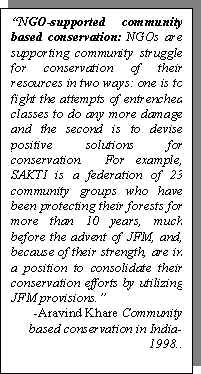| Nooru in Telugu language means hundred. Inti mean related to houses. Adavi means forest. Noorinti adavi means forest related to hundred houses. Houses is a auspicious word. The community lands (common property resources) in the tribal areas of east godavari popularly described as Rampa country during British times as are called 'Noorinti' Here is an extract about the management of common property resources.
"Village communal property is carefully preserved. Topes are the joint property of the villagers and the income therefrom, especially from tamarind, is distributed amongst the shareholders. New-comers have no claim to a share.
The fruit is collected by the villagers income from time to time as it ripens and the yield is then and there distributed among the shareholders. When labour is needed for any Government work, one man from each house is expected to present himself and his wages are distributed amongst all the villagers, the old, the blind, the maimed and the widows all getting a share. Thus it can be seen that the peculiarities of the joint village system are carefully preserved.
Serious crime is rare and theft is almost unknown. In fact, the entrances to the dwellings are not secured by bolts or other fastenings. Harvested crops are leftin the field or threshing-floor and no one is set to watch them. Seldom does a village resound with the quarrels or wrangles of either sex, and in this respect it presents a marked contrast to the frequent street brawls in the so-called civilized towns.
The people live undisturbed by the rush and bustle of the outside world. While the village remains entire and its internal economy undisturbed, the Agency man cares not who administers the land.
Village organisation. - the village resembles a township and consists of communities held together by ties of kinship. Its establishment consists of a munsif or headman, a Pettendar, (V.M.'s assistant) and a village servant (bariki or kolagadu). The munsif has general superintedndence of the village, attends to the police duties and collects revenue. He is not a mere headman "primus inter papes" He is a virtual autocrat. He is the sole representative of the country in its dealings with the Government and with the outside world. He settles all non-religious disputes in the village without the assistance of any council or resorting to the police or courts of law.
It is the custom to settle all religious and social disputes occurring among the inhabitants by arbitration.
These officers receive little pay for their services, but they are entitled to certain small shares or perquisites from the topes of the villages".
NOTE ON THE RAMPA AGENCY
EAST GODAVARI DISTRICT
M.R.Ry. V.N. SESHAGIRI RAO Avargal, B.A..
Extra Assistant Conservator of Forest
MADRAS PRESIDENCY
PRINTED BY THE SUPERINTENDENT GOVERNMENT PRESS
1931.

|